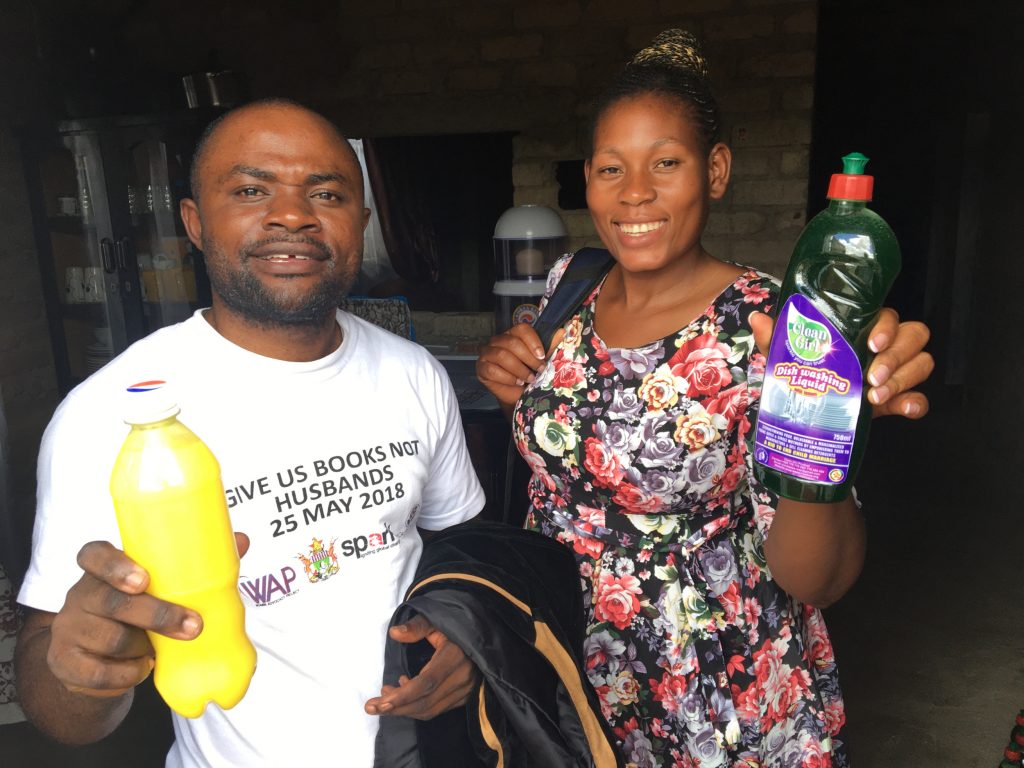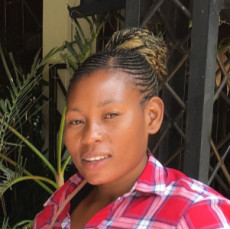
Constance, right, and her husband Dickson, with bottles of Clean Girl soap – WAP’s special brand.
Corona Virus pandemic has left Zimbabwe in an extremely difficult situation. As of end March to date, the number of infections and deaths from the pandemic remains low – 617 confirmed cases and 7 deaths- compared to many other nations that have seen higher infection and death rate https://www.worldometers.info/coronavirus/country/zimbabwe/-.
President E. Munangagwa announced a 21-day lockdown which began on 30 March- a message which was hard to bear- but with a frail health infrastructure, the only way Zimbabweans have a chance is through strict preventative measures. It was later extended several times in this period of three months in a bid to contain the spread of the corona virus. The declaration ordered all citizens to stay at home, “except in respect of essential movements related to seeking health services, the purchase of food”, or carrying out responsibilities that are in the critical services sectors.
Other measures include the shutting down of public markets in the informal sector, except those that sell food.
None of this was easy to adapt in Zimbabwe, considering that the country has an economic profile similar to that of many developing countries. The difference is that its informal sector makes up a much higher percentage of the overall economy.
According to a 2018 International Monetary Fund report, Zimbabwe’s informal economy is the largest in Africa, and second only to Bolivia in the world. The sector accounts for at least 60% of all of Zimbabwe’s economic activity. Even those employed in the formal economy augments their income through informal sector activities such as cross-border trading. A very high number of Zimbabweans make a living in this sector, or rely on it for food, clothing, fuel, and cash. Most of these activities still remain on hold.
In addition, Zimbabwe has an added set of problems: its economy is broken. A nationwide lockdown announced without any stimulus financial package to cushion the poor and businesses from the impact of the lockdown inflicted further damage to an already extremely fragile economy.
Everything became hard, only restricted movement visits to supermarkets and pharmacies within a five-kilometer radius of people’s homes was given.
In enforcing restrictions on movement and gatherings, security forces arrested thousands of people with some being brutally handled and tortured.
This situation affected most activities/ efforts carried out by civil society organizations including that of the Women Advocacy Project in serving the marginalized groups. WAP’s girls could not manage to carry on with their weekly educational and soap making meetings. Many people struggled to access food, water, and medical care.
The Women Advocacy Project is playing an effective role in helping stop the spread of the virus in impoverished communities. With financial support given to us by Action for World Solidarity, Rockflower, the Advocacy Project and the Pollination Project, WAP launched an Emergency Project aimed at fighting the spread of corona virus pandemic in poor and slum communities. WAP is donating disinfectant kits that include reusable masks, hand washing soap and the WHO printed information posters with main COVID-19 prevention messages to guide people and families on how to effectively practice preventive measures. The kits are being distributed in local health clinics and poor families directly in Chitungwiza and Epworth townships. This is possibly one of the best ways to support our communities and also create increased awareness for prevention.
In addition, WAP has also distributed small food hampers to 100 families in both Chitungwiza and Epworth.
Posted By Constance Mugari
Posted Jul 6th, 2020


4 Comments
Brigid
July 8, 2020
Constance, your blog was very eye-opening to read, as I was totally unaware of how this pandemic has been affecting Zimbabwe. The work that WAP is doing is incredible to hear about, and this blog really showed me the importance of making sure educational and health resources are equally distributed (as well as the negative effects if they are not).
Iain Guest
July 12, 2020
Hi Constance. It’s so nice to see you using our website! Welcome! After working with you for four years we know that you and your Team are very effective – and we are very impressed by how well you’ve responded to the COVID crisis. I hope you can share this blog with your friends and ask them to comment. My questions would be – what does it feel like to be locked down, unable to move about, and running short of ? How are the girls coping? Are people wearing masks of their own accord – as opposed to being pressured by the government? What do Zimbabweans say about America? We’d love to get your perspective!
Klemens
July 13, 2020
Hi Constance, it’s good to see that you’re sharing your experiences with a bigger audience on this platform. The bigger the international awareness the bigger might be the solidarity. Stay healthy and safe!
Alexandra Mayer
July 17, 2020
Constance, thank you for your post. I think your experience really highlights how the struggle of Covid19 extends so far beyond the virus itself. This pandemic is certainly exposing the deep routed inequalities in our societies. I hope we can utilize this exposure to create a better world going forward.